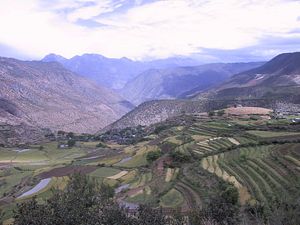As Myanmar’s armed forces continue their assault on the ethnic Kokang Myanmar National Democratic Alliance Army (MNDAA), damage continues to spill across the border into southwestern Yunnan province in China. As The Diplomat recently noted, a bomb dropped by a Myanmar Air Force MiG-29 landed in a sugarcane field in Yunnan, killing five Chinese. The incident led to sharp criticism from senior Chinese officials, and Myanmar indicated that it would investigate the incident and prevent its recurrence. Still, despite these assurances, there are reports of continued forays across the border by Myanmar forces. China, for its part, has deployed People’s Liberation Army Air Force (PLAAF) jets to monitor the air space and repel any incursions by Myanmar forces.
Still, despite this incident and the ensuing rhetoric, the fighting continues to spill over the increasingly porous Myanmar-China border. Radio Free Asia reports that Yunnan authorities are investigating “a group of unexploded bombs that fell on the mountainous and rugged border with Myanmar.” According to the report, which was based off eyewitness reports, the bombs dropped at “around 4.00 p.m. local time outside Mengdui township near Yunnan’s Lincang city” on Saturday. The continued cross-border incursions will likely intensify the frustration of the Chinese government which has already issued several stern warnings to Myanmar.
The highest profile Chinese warnings to the government of Myanmar came courtesy of Premier Li Keqiang. Li noted that Chinese citizens had “suffered loss of life and property,” as a result of Myanmarese actions, and that China has “the responsibility and the capacity to firmly safeguard the security and stability of the Chinese-Myanmar frontier.” Li’s comments came after General Fan Changlong, vice chairman of China’s Central Military Commission (CMC), told the commander-in-chief of Myanmar’s armed forces that the “Chinese military will take resolute measures to protect the safety of Chinese people and their assets.”
Echoing General Fan’s comments, Colonel Geng Yansheng noted that “If there is another incident of a Myanmar military plane overflying the border or other serious acts that endanger Chinese territorial sovereignty and national security, the Chinese military will respond by taking decisive measures.” He also highlighted the increased Chinese military presence along the border.
The diplomatic subtext is intensified by accusations from the Myanmar side that the Chinese government is covertly provided material and intelligence support to the Kokang rebels. Recently, as part of Xi Jinping’s intensified anti-corruption campaign in the Chinese military, a PLA general was sacked amid accusations that he leaked state secrets to the rebels in Myanmar — his dismissal was a signal that while rogue elements may exist within the PLA and the Yunnan government that sympathize with the cause of the ethnic Chinese Kokang rebels, the top leadership of the CCP will not sponsor cross-border interference.
For the Chinese government, the brewing crisis at the Myanmar border will be a sharp reminder of how nationalism can often be a double-edged sword for the legitimacy of the party. When times are good, nationalism imbues and emboldens the senior leadership. However, with the loss of Chinese lives at the hands of a foreign military, an upsurge in nationalist impulses could force Xi Jinping’s hand to respond with a heavier hand than he might if left to his own devices (I had the pleasure of discussing this issue in more detail with Shannon Tiezzi on our most recent podcast here at The Diplomat).
The PLA is currently building up forces and taking preventative precautions in Yunnan. According to the Washington Free Beacon, PLAAF J-7 supersonic fighters are based at civilian airports, which have been closed amid the fighting.

































